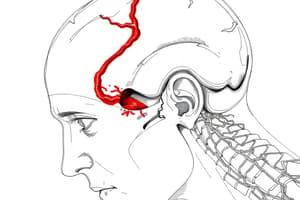Podcast
Questions and Answers
What is the primary function of a neurologist?
What is the primary function of a neurologist?
- To take care of people with neurologic problems (correct)
- To treat infections in the body
- To perform surgery on the brain
- To manage heart diseases
What type of stroke is caused by a blocked blood vessel?
What type of stroke is caused by a blocked blood vessel?
- Brain aneurysm
- Ischemic stroke (correct)
- Hemorrhagic stroke
- Transient ischemic attack
Which of the following is NOT a symptom of a stroke?
Which of the following is NOT a symptom of a stroke?
- Sudden high fever (correct)
- Arm weakness
- Face drooping
- Speech difficulty
What characterizes bacterial meningitis in comparison to viral meningitis?
What characterizes bacterial meningitis in comparison to viral meningitis?
What does NOT indicate a possible stroke?
What does NOT indicate a possible stroke?
What is a critical action to take when identifying stroke symptoms?
What is a critical action to take when identifying stroke symptoms?
Which of the following is a symptom of meningitis?
Which of the following is a symptom of meningitis?
What condition is commonly associated with neurodegenerative disorders?
What condition is commonly associated with neurodegenerative disorders?
What is the primary function of the cerebellum?
What is the primary function of the cerebellum?
Which part of the brain is responsible for automatic functions like heart rate and body temperature?
Which part of the brain is responsible for automatic functions like heart rate and body temperature?
What regulates growth, metabolism, and reproduction in the body?
What regulates growth, metabolism, and reproduction in the body?
Neurons are specialized cells composed of what components?
Neurons are specialized cells composed of what components?
What is the largest part of the brain known for interpreting senses such as vision and hearing?
What is the largest part of the brain known for interpreting senses such as vision and hearing?
Which of the following does NOT describe a function of the brain?
Which of the following does NOT describe a function of the brain?
What is one of the main roles of the cerebral hemispheres?
What is one of the main roles of the cerebral hemispheres?
What is the primary role of neurons in the brain?
What is the primary role of neurons in the brain?
What is cataract primarily described as?
What is cataract primarily described as?
What role does the thyroid gland play in the body?
What role does the thyroid gland play in the body?
Hypothyroidism is often caused by which condition?
Hypothyroidism is often caused by which condition?
Maxillofacial surgery encompasses which of the following?
Maxillofacial surgery encompasses which of the following?
What is the primary function of the hormones secreted by the thyroid?
What is the primary function of the hormones secreted by the thyroid?
What are the initial symptoms of certain neurological disorders?
What are the initial symptoms of certain neurological disorders?
What is the primary focus of psychiatry?
What is the primary focus of psychiatry?
Which statement about psychologists is true?
Which statement about psychologists is true?
What incident significantly impacted Phineas Gage's personality?
What incident significantly impacted Phineas Gage's personality?
What role do teeth play in the digestive process?
What role do teeth play in the digestive process?
What begins the digestive process?
What begins the digestive process?
What is a key function of saliva in digestion?
What is a key function of saliva in digestion?
Which type of psychologist specializes in cognitive, emotional, and social processes?
Which type of psychologist specializes in cognitive, emotional, and social processes?
Which group is most at risk for serious health issues related to a rash, nausea, or severe headaches?
Which group is most at risk for serious health issues related to a rash, nausea, or severe headaches?
What symptom is NOT associated with a concussion?
What symptom is NOT associated with a concussion?
Which diagnostic procedure is specifically used to examine brain activity?
Which diagnostic procedure is specifically used to examine brain activity?
Which of the following are cognitive symptoms of a concussion?
Which of the following are cognitive symptoms of a concussion?
What is the most common type of dementia?
What is the most common type of dementia?
What is a characteristic of Parkinson’s disease?
What is a characteristic of Parkinson’s disease?
Which assessment technique is not typically used for diagnosing brain-related issues?
Which assessment technique is not typically used for diagnosing brain-related issues?
What initiates the progression of Alzheimer's disease?
What initiates the progression of Alzheimer's disease?
Flashcards are hidden until you start studying
Study Notes
Neurology Overview
- Neurologists specialize in diagnosing and treating neurological disorders including strokes, movement disorders, neurodegenerative diseases, seizure disorders, and infections affecting the brain and nervous system.
- Stroke: Medical condition caused by inadequate blood flow to the brain leading to cell death; characterized by symptoms such as facial drooping, arm weakness, and speech difficulties.
- Types:
- Ischemic stroke: Most common, caused by blood clot blocking circulation.
- Hemorrhagic stroke: Caused by bleeding due to ruptured vessels.
- Types:
- Symptoms of stroke include dizziness, loss of vision on one side, inability to move or feel on one side, and sudden speech problems.
Meningitis
- Meningitis refers to the inflammation of membranes surrounding the brain and spinal cord; can be viral (most common) or bacterial (more severe).
- Symptoms include sudden high fever, neck stiffness, light sensitivity, sleepiness, and potential complications like hearing loss and brain damage.
The Brain
- Situated in the head and protected by the skull; crucial for intelligence, movement initiation, behavior control, and sensory interpretation.
- Key parts of the brain:
- Cerebrum: Largest part responsible for processes like speech, emotion, and learning.
- Cerebellum: Coordinates muscle movements and maintains posture.
- Brain Stem: Controls automatic functions (breathing, heart rate, etc.).
The Pituitary Gland
- Master gland that regulates other glands through hormone secretion, impacting growth, metabolism, and reproduction.
Neurons and Glial Cells
- Neurons: Specialized cells composed of axons, integral to the nervous system's functionality.
- Symptoms of serious conditions include skin rash, nausea, severe headaches, and seizures, particularly in individuals with weakened immune systems or children.
Traumatic Head Injuries
- Commonly caused by accidents; symptoms include headaches, nausea, dizziness, confusion, and sensory changes (blurry vision, sensitivity to light).
- Concussions can result from various types of trauma, often requiring emergency care.
Radiology
- Specializes in diagnostic imaging techniques including X-rays, CT scans, MRI, and PET scans to visualize brain conditions.
Neurodegenerative Disorders
- Alzheimer’s Disease: Most common type of dementia, characterized by progressive memory loss and brain shrinkage due to protein aggregation leading to neuron death.
- Parkinson’s Disease: A brain disorder leading to uncontrollable movements, stiffness, and coordination issues, with gradual symptom onset and worsening over time.
Psychiatry
- This branch of medicine addresses mental health disorders such as schizophrenia, depression, addiction, and bipolar disorder.
- Psychiatrists are medical doctors who can prescribe medication; psychologists focus on behavioral therapy without medication prescribing capabilities.
The Mouth and Oral Cavity
- Initial part of the digestive system; digestion starts here with teeth, saliva, and the tongue aiding in breaking down food.
Maxillofacial Surgery
- Involves procedures for facial trauma, reconstruction, cosmetic surgery, and surgery of the oral cavity, including cleft lip and palate repair.
The Thyroid Gland
- Butterfly-shaped gland in the neck that secretes hormones (T3, T4, and peptide hormone) influencing metabolism, growth, and development in children.
- Conditions affecting the thyroid include congenital iodine deficiency syndrome and hypothyroidism, commonly resulting from iodine deficiency during pregnancy.
Studying That Suits You
Use AI to generate personalized quizzes and flashcards to suit your learning preferences.




